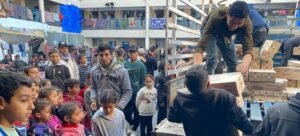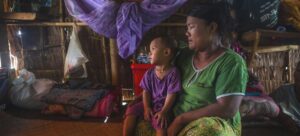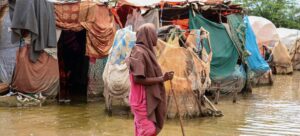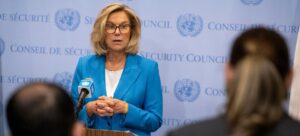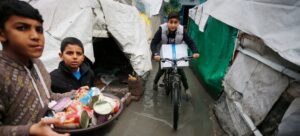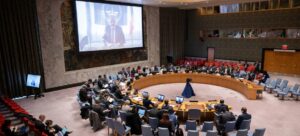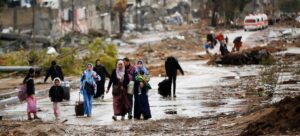Despite the “horrifying” allegations that 12 UNWRA staff were involved in the Hamas-led terror attacks on Israel on 7 October, “we must not prevent an entire organization from delivering on its mandate to serve people in desperate need”, said the UN-led group of aid agencies, known collectively as the Inter-Agency Standing Committee (IASC).
Regional collapse
“Withdrawing funds from UNRWA …would result in the collapse of the humanitarian system in Gaza, with far-reaching humanitarian and human rights consequences in the Occupied Palestinian Territory and across the region,” warned the IASC panel, headed by UN emergency relief chief Martin Griffiths.
Hundreds of thousands of people have been left homeless and “on the brink of famine”, the IASC Principals said, since Israeli bombardment and a ground invasion began after the Palestinian militants butchered some 1,200 people in Israeli communities and took more than 250 others hostage.
Historic role
UNRWA
UNRWA – the largest aid agency in Gaza whose key role in education, healthcare and more in the enclave dates back to 1949 – provides a lifeline to more than two million people in the Strip.
Its future is in jeopardy after several major donors halted funds pending probes into Israel’s allegations that 12 of the agency’s 30,000 staff played a role in the 7 October attacks.
Probe activated
A full and urgent investigation is already underway by the Office of Internal Oversight Services (OIOS) – the highest investigative body in the UN system – the IASC chiefs said, noting in addition that UNRWA had announced an independent review of its operations.
“Decisions by various Member States to pause funds for UNRWA will have catastrophic consequences for the people of Gaza,” the IASC statement continued. “No other entity has the capacity to deliver the scale and breadth of assistance that 2.2 million people in Gaza urgently need.”
In its latest humanitarian update, the UN aid coordination office, OCHA, noted that the death toll in Gaza since continuing “intense” Israeli bombardment began had now risen to at least 26,751, according to the enclave’s health authorities.
Hostilities continued to be “particularly intense” in the southern city of Khan Younis, OCHA reported late on Tuesday, “with heavy fighting reported near Nasser and Al Amal hospitals, and reports of Palestinians fleeing to the southern town of Rafah, which is already overcrowded, despite the lack of a safe passage”.
Ground operations and clashes between Israeli forces and Palestinian armed groups were also reported across much of Gaza, OCHA noted, with new evacuation orders issued to neighbourhoods in western Gaza city on Monday and Tuesday, including Ash Shati Refugee Camp, Rimal Ash Shamali and Al Janubi, Sabra, Ash Sheikh ‘Ajlin, and Tel Al Hawa.
“The new order covered an area of 12.43 square kilometres…This area was home to almost 300,000 Palestinians before 7 October and, subsequently, 59 shelters with an estimated 88,000 internally displaced people (IDPs) seeking refuge there,” OCHA said.
Shrinking space to shelter
Mass evacuation orders issued by the Israeli military that began on 1 December cover a total of 158 square kilometres, amounting to 41 per cent of the Gaza Strip. “This area was home to 1.38 million Palestinians before 7 October and, subsequently, it contained 161 shelters hosting an estimated 700,750 IDPs,” according to the UN aid coordination office.
As of 30 January, 218 Israeli soldiers have been confirmed killed and 1,283 injured, citing the Israeli military.
The past week has also seen “large numbers of Palestinian men” detained by the Israeli military at a checkpoint in Khan Younis “with many of them stripped to their underwear, blindfolded and taken away”, the OCHA update reported.
Vulnerable populations in northern and central Gaza are increasingly beyond reach because of “an increasing trend in denied and restricted access”, the UN aid coordination office reported. “The reasons include excessive delays for humanitarian aid convoys before or at Israeli checkpoints and heightened hostilities in central Gaza. Threats to the safety of humanitarian personnel and sites are also frequent, impeding the delivery of time-sensitive and life-saving aid and pose serious risks to those involved in humanitarian efforts.”
The 14 IASC signatories to the appeal are:
- Martin Griffiths, Emergency Relief Coordinator and Under-Secretary-General for Humanitarian Affairs (OCHA)
- Jane Backhurst, Chair, ICVA (Christian Aid)
- Jamie Munn, Executive Director, International Council of Voluntary Agencies (ICVA)
- Amy E. Pope, Director General, International Organization for Migration (IOM)
- Volker Türk, United Nations High Commissioner for Human Rights (OHCHR)
- Paula Gaviria Betancur, United Nations Special Rapporteur on the Human Rights of Internally Displaced Persons (SR on HR of IDPs)
- Achim Steiner, Administrator, United Nations Development Programme (UNDP)
- Natalia Kanem, Executive Director, United Nations Population Fund (UNFPA)
- Filippo Grandi, United Nations High Commissioner for Refugees (UNHCR)
- Michal Mlynár, Executive Director a.i., United Nations Human Settlement Programme (UN-Habitat)
- Catherine Russell, Executive Director, UN Children’s Fund (UNICEF)
- Sima Bahous, Under-Secretary-General and Executive Director, UN Women
- Cindy McCain, Executive Director, World Food Programme (WFP)
- Tedros Adhanom Ghebreyesus, Director-General, World Health Organization (WHO)
